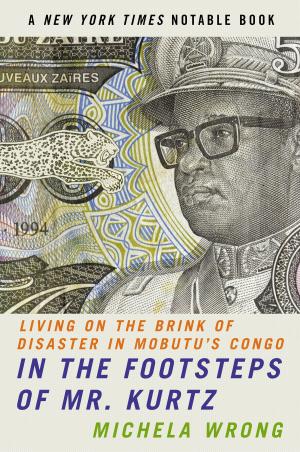A History Of Efon-Alaaye Kingdom From 1180 A.D. To Present Day
A Study in Militarism, Heroism and Adventurism
Nonfiction, History, Africa| Author: | Adebanji Aladejare, Adebyonbo Aladejare | ISBN: | 1230001969160 |
| Publisher: | PeneSight Press | Publication: | October 17, 2017 |
| Imprint: | Language: | English |
| Author: | Adebanji Aladejare, Adebyonbo Aladejare |
| ISBN: | 1230001969160 |
| Publisher: | PeneSight Press |
| Publication: | October 17, 2017 |
| Imprint: | |
| Language: | English |
About 1040 A.D., the Ayes of Iraye left the suburb of Ile Ife (Center of African Spirituality and the cradle of Yoruba Civilization) in search of larger territory and finally about 1180 A.D., King Iji-Emigun led the AYES out of IGBOLE-AYEand founded Efon-Alaaye Kingdom. According to Efon oral Tradition, the Kingdom had 12 sub-towns under the dominion of the Alaye (King) of Efon. Moreover, Efon was a regimented society. Before the advent of the British administration, there was no dichotomy (difference) between administrative and judicial functions in Efon Both functions were rolled together. There was nothing like the separation of power, as we know it today where there are dichotomies between Legislative, the Executive and the Judiciary. The Traditional Council OF Efon performed both functions (Judicial and administration) at the same time and place. The OLORI-EBI or a few elders who happened to be present settled trivial matters in the family usually. More serious cases were referred either to the High Chiefs of the Quarters. In most cases, civil matters were settled out of court by arbitration. The word Efon was synonymous with warmongering, gallantry and fortitude especially in the 19th century during the fratricidal or internecine wars that engulfed the whole of Yorubaland. Efonwas famous in Ekiti and beyond as fierce and warlike. To be precise, Efon was a militarist society in the days gone-by. Before one can be conferred with a chieftaincy title in the days of old, as a rule, he must have displayed an extraordinary bravery, heroism and fortitude in battles. Consequently, within a period of 84 years, from 1797 to 1879, Efon went to war about 14 times. Great War Generals that could hold their own among any contemporary Generals in those days were produced in Efon. In the ancient times, the people of Efon were renowned throughout Yorubaland and beyond for their remarkable skill in the art of medicine. Actually, the word Efon was tantamount to the vocation of Medicine. In the days gone by, Efon medicine practitioners migrated en-masse to Cosmopolitan Yoruba cities like Ibadan and Lagos to ply their trade. Some of the descendants of these medical practisioners of Efon descent are Sanusi Adebisi Idikan, the first Ibadan entrepreneur and philantopist as well as Ibadan businessman, Abdulazeez Arisekola Alao.
About 1040 A.D., the Ayes of Iraye left the suburb of Ile Ife (Center of African Spirituality and the cradle of Yoruba Civilization) in search of larger territory and finally about 1180 A.D., King Iji-Emigun led the AYES out of IGBOLE-AYEand founded Efon-Alaaye Kingdom. According to Efon oral Tradition, the Kingdom had 12 sub-towns under the dominion of the Alaye (King) of Efon. Moreover, Efon was a regimented society. Before the advent of the British administration, there was no dichotomy (difference) between administrative and judicial functions in Efon Both functions were rolled together. There was nothing like the separation of power, as we know it today where there are dichotomies between Legislative, the Executive and the Judiciary. The Traditional Council OF Efon performed both functions (Judicial and administration) at the same time and place. The OLORI-EBI or a few elders who happened to be present settled trivial matters in the family usually. More serious cases were referred either to the High Chiefs of the Quarters. In most cases, civil matters were settled out of court by arbitration. The word Efon was synonymous with warmongering, gallantry and fortitude especially in the 19th century during the fratricidal or internecine wars that engulfed the whole of Yorubaland. Efonwas famous in Ekiti and beyond as fierce and warlike. To be precise, Efon was a militarist society in the days gone-by. Before one can be conferred with a chieftaincy title in the days of old, as a rule, he must have displayed an extraordinary bravery, heroism and fortitude in battles. Consequently, within a period of 84 years, from 1797 to 1879, Efon went to war about 14 times. Great War Generals that could hold their own among any contemporary Generals in those days were produced in Efon. In the ancient times, the people of Efon were renowned throughout Yorubaland and beyond for their remarkable skill in the art of medicine. Actually, the word Efon was tantamount to the vocation of Medicine. In the days gone by, Efon medicine practitioners migrated en-masse to Cosmopolitan Yoruba cities like Ibadan and Lagos to ply their trade. Some of the descendants of these medical practisioners of Efon descent are Sanusi Adebisi Idikan, the first Ibadan entrepreneur and philantopist as well as Ibadan businessman, Abdulazeez Arisekola Alao.















